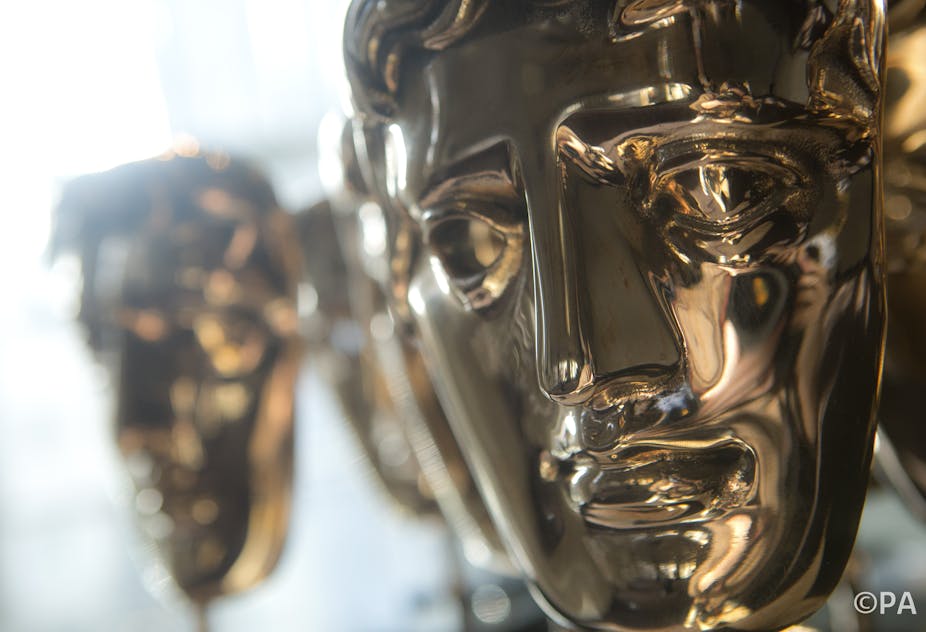Britishness seemed to be main motif in the BBC’s broadcast of the 2014 Baftas. When host Stephen Fry mentioned the event was the highlight of the British film calendar, he backtracked and asked, “Is there such a thing as a British film calendar?”
He did well to ask, because the constellation of stars he took great trouble to show off – Leonardo Di Caprio, Brad Pitt, Angelina Jolie, Cate Blanchett, Bradley Cooper, Amy Adams, Christian Bale, Tom Hanks – is no different to what we’d expect to see at the Oscars.
At the Oscars, one wouldn’t have had to rely on Twitter to learn that Brad Pitt and Angelina wore matching Yves Saint Laurent tuxedos, Lily Allen was in Vivienne Westwood, Amy Adams wore Victoria Beckham and Cate Blanchett wore Alexander McQueen; there would have been a whole series of programmes right up to the start of the broadcast breathlessly recounting every aspect in great detail, and using the very latest technological developments to broadcast every stitch to an eager public, garnering worldwide unpaid publicity for the giant fashion houses. But as Oprah Winfrey said before the British show started, “This is not about glitz and glamour.”
But what are the Baftas about? What are they for? You might think to honour, celebrate and promote British cinema. But a different story emerges when one looks at the nominees. Bruce Dern, Leonardo Di Caprio and Tom Hanks, for example, were contenders for Best Actor.

Indeed, when the first award of the evening was announced, and Gravity won Outstanding British Film, the twittersphere went into a frenzy of speculation as to what was British about it. A friend of mine – who works for an independent British distributor – insisted “It is NOT a British film. It is NOT a British film. It is NOT a British Film.” Three times. Just in case we didn’t get the message.
Of course, there’s no need to get too purist about these things. The nominations don’t necessarily reflect a particular definition of British cinema, one which would probably run something along the lines of: films predominantly financed in Britain, about British stories, with a predominantly British cast and crew (Philomena and The Selfish Giant would be unproblematic examples). But they do reflect British film culture: the films celebrated are the films that have entertained, delighted and informed us here, be they British or not.
And later in the show, when Alfonso Cuarón returned to the stage to collect his award for Best Director, and had presumably been made aware of the brouhaha over Gravity’s win for Best British Film he said:
I consider myself part of the British Film Industry. I’ve lived here for 13 years and made about half my films here. I guess I make a good case for the curbing of immigration.
Yet, at the end of his speech, the cinematic culture Cuarón feels a part of was made clear when he thanked Guillermo del Toro and Alejandro Iñárritu, Mexican compadres and current colleagues in the higher reaches of global cinema. “I wouldn’t order breakfast before consulting them first,” he said.
A concern with Britishness and its articulation continued as a recurring motif. Earlier in the show, after Stephen Fry introduced her as a “ghastly piece of shrieking, stinking offal”, Emma Thomson replied, “Is it me or being British that means being referred to as a stinking piece of offal make me feel so much better about myself?”
The finale of the evening was when Prince William, in his role as president of Bafta, introduced Jeremy Irons to bring out the pomp and ceremony and recount the highlights of Helen Mirren’s career. Accepting the award for her Fellowship of the Baftas, Mirren first thanked her old teacher, Alice Welding, who recently died at the age of 102, for having inspired her to desire to live in a world of literature and poetry. She finished off her acceptance speech with a dazzling oration that invoked both acting and Albion, the “We are such stuff as dreams are made on” speech from The Tempest.

It was a rather theatrical and very British end to a Baftas that saw 12 Years a Slave, a film which had Channel Four funding, a British director and a large British cast, win Best Film, but Gravity, with its American money and cast and its Mexican director, win Best British film. Chiwetel Ejiofor, black and British, won Best Actor.
Oh, and The Great Beauty, the winner of Best Foreign Film, didn’t even make it to the broadcast. It was put in the little “These awards were handed out earlier” addendum after the end of the main programme. So the Britishness of these Baftas seems to be defined by placing America at the centre, various articulations of Britishness on the margins and in the “specialised” categories – such as the “Michael Balcon Outstanding Contribution to British Cinema”. And the rest of the world? Utterly out of the picture.

